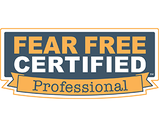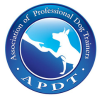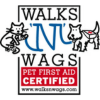|
Besides being incredibly entertaining, puppy play provides young dogs with many invaluable learning experiences. The socialization stage of puppy development begins at 3 weeks and ends around 14 weeks. During this time, puppies are highly receptive to learning and what they experience positively can shape what they feel confident and comfortable with as an adult. Creating positive learning opportunities for puppies involves careful placement of puppies, a sensitivity to their individual emotional states and lots of active supervision. Puppies bring differing levels of confidence, experience, interest, energy and comfort to their encounters with other dogs and need to be matched with appropriate social partners. Raising a socially successful puppy also involves more than just having a dog that wants to greet and play with everyone. Puppies need to practice a variety of skills including the ability to ignore dogs, disengage from play, manage their arousal, play appropriately, and ideally, grow up finding their humans way more fun to play with than dogs! Dreamland Pet’s Pup Social is a special 45 minute - 1 hour social skills class designed just for dogs 10 weeks – 12 months of age. Our flexible program offers open enrollment, meaning you can decide weekly whether to attend and only pay for the classes in which you participate. Puppies can attend the program as long as we have a suitable group, or until they either age out of the program or we determine the setting is no longer supporting the behaviours we want to develop. |
Pricing$23.00 + HST per class Classes run mornings and afternoons each Saturday Questions before registering?Please contact us at play@dreamlandpet.ca for more information. *Please note, trainers do not work in-store and are only available for contact via email at this point. |
What to Bring:
|
Your pup will practice:
|
Our Trainer maintains the following certifications:

.png)




.png)